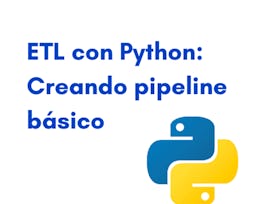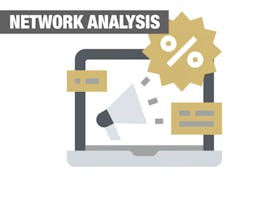This second course in statistical modeling will introduce students to the study of the analysis of variance (ANOVA), analysis of covariance (ANCOVA), and experimental design. ANOVA and ANCOVA, presented as a type of linear regression model, will provide the mathematical basis for designing experiments for data science applications. Emphasis will be placed on important design-related concepts, such as randomization, blocking, factorial design, and causality. Some attention will also be given to ethical issues raised in experimentation.


ANOVA and Experimental Design
This course is part of Statistical Modeling for Data Science Applications Specialization
Taught in English
Some content may not be translated

Instructor: Brian Zaharatos
4,364 already enrolled
Included with 
Course
(13 reviews)
Recommended experience
What you'll learn
Identify and interpret the two-way ANOVA (and ANCOVA) model(s) as a linear regression model.
Use the two-way ANOVA and ANCOVA models to answer research questions using real data.
Define and apply the concepts of replication, repeated measures, and full factorial design in the context of two-way ANOVA.
Skills you'll gain
Details to know

Add to your LinkedIn profile
24 quizzes
Course
(13 reviews)
Recommended experience
See how employees at top companies are mastering in-demand skills

Build your subject-matter expertise
- Learn new concepts from industry experts
- Gain a foundational understanding of a subject or tool
- Develop job-relevant skills with hands-on projects
- Earn a shareable career certificate


Earn a career certificate
Add this credential to your LinkedIn profile, resume, or CV
Share it on social media and in your performance review

There are 4 modules in this course
In this module, we will introduce the basic conceptual framework for experimental design and define the models that will allow us to answer meaningful questions about the differences between group means with respect to a continuous variable. Such models include the one-way Analysis of Variance (ANOVA) and Analysis of Covariance (ANCOVA) models.
What's included
9 videos4 readings9 quizzes2 programming assignments1 peer review1 discussion prompt2 ungraded labs
In this module, we will learn how statistical hypothesis testing and confidence intervals, in the ANOVA/ANCOVA context, can help answer meaningful questions about the differences between group means with respect to a continuous variable.
What's included
6 videos2 readings4 quizzes1 programming assignment1 peer review2 ungraded labs
In this module, we will study the two-way ANOVA model and use it to answer research questions using real data.
What's included
7 videos6 quizzes1 programming assignment1 peer review1 ungraded lab
In this module, we will study fundamental experimental design concepts, such as randomization, treatment design, replication, and blocking. We will also look at basic factorial designs as an improvement over elementary “one factor at a time” methods. We will combine these concepts with the ANOVA and ANCOVA models to conduct meaningful experiments.
What's included
7 videos2 readings5 quizzes1 programming assignment1 peer review2 ungraded labs
Instructor

Offered by
Recommended if you're interested in Probability and Statistics

University of Colorado Boulder

University of Colorado Boulder

Coursera Project Network

University of Colorado Boulder
Get a head start on your degree
This course is part of the following degree programs offered by University of Colorado Boulder. If you are admitted and enroll, your coursework can count toward your degree learning and your progress can transfer with you.
Why people choose Coursera for their career




Learner reviews
Showing 3 of 13
13 reviews
- 5 stars
61.53%
- 4 stars
7.69%
- 3 stars
7.69%
- 2 stars
7.69%
- 1 star
15.38%
Reviewed on Jul 30, 2022
New to Probability and Statistics? Start here.

Open new doors with Coursera Plus
Unlimited access to 7,000+ world-class courses, hands-on projects, and job-ready certificate programs - all included in your subscription
Advance your career with an online degree
Earn a degree from world-class universities - 100% online
Join over 3,400 global companies that choose Coursera for Business
Upskill your employees to excel in the digital economy
Frequently asked questions
Access to lectures and assignments depends on your type of enrollment. If you take a course in audit mode, you will be able to see most course materials for free. To access graded assignments and to earn a Certificate, you will need to purchase the Certificate experience, during or after your audit. If you don't see the audit option:
The course may not offer an audit option. You can try a Free Trial instead, or apply for Financial Aid.
The course may offer 'Full Course, No Certificate' instead. This option lets you see all course materials, submit required assessments, and get a final grade. This also means that you will not be able to purchase a Certificate experience.
When you enroll in the course, you get access to all of the courses in the Specialization, and you earn a certificate when you complete the work. Your electronic Certificate will be added to your Accomplishments page - from there, you can print your Certificate or add it to your LinkedIn profile. If you only want to read and view the course content, you can audit the course for free.
If you subscribed, you get a 7-day free trial during which you can cancel at no penalty. After that, we don’t give refunds, but you can cancel your subscription at any time. See our full refund policy.

